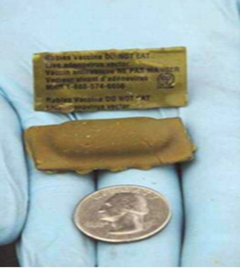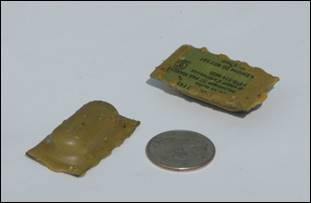For Immediate Release: May 11, 2023
Media Contacts:
Owen Montgomery USDA, APHIS, WS
802-272-1072
owen.j.montgomery@usda.gov
Ben Truman │ Vermont Department of Health
802-316-2117 / 802-863-7281
bennett.truman@vermont.gov
USDA Officials Plan Spring Wildlife Vaccination Effort to Address Rabies in Chittenden County
Distribution of oral rabies vaccine bait will start May 11
BURLINGTON, VT – The U.S. Department of Agriculture (USDA) Wildlife Services, in coordination with the Vermont Department of Health, has scheduled a special bait drop this month to address a local wildlife rabies outbreak in Chittenden County.
This effort is in addition to the statewide bait drop that occurs annually in August. Beginning May 11, rabies vaccine – in the form of a sweet-smelling oral bait that is attractive to raccoons and skunks – will be dropped from a low-flying helicopter and placed by hand in residential areas.
Rabies is a deadly viral disease of the brain that infects mammals and without post-exposure treatment is fatal to both humans and animals. In Vermont, rabies is most often seen in raccoons, skunks, foxes, bats and woodchucks, but pets and livestock can also get the disease if they have not been vaccinated for rabies. The virus is spread primarily through the bite of an infected animal.
Since March 2022, 28 animals tested positive for rabies in Chittenden County, including 19 raccoons, seven skunks, and two bats. In October 2022, USDA Wildlife Services responded to the uptick by hand vaccinating over 700 raccoons, skunks, and foxes before releasing them back into the wild.
"We typically expect to see only one or two rabid animals in Chittenden County in a year, most commonly in bats,” said Natalie Kwit, DVM, state public health veterinarian for the Health Department. “This bait drop will help prevent further spread of rabies among wildlife, protecting people and domestic animals who may come into contact with them.”
Officials are still learning why more animals are testing positive for rabies but said ample alternative food sources in urban areas like greater Burlington present challenges in enticing the animals to eat the oral vaccine. This additional, focused bait drop is expected to help.
The spring oral rabies vaccine (ORV) bait distribution will begin May 11 and continue through approximately May 19 Chittenden County. Residents of Colchester, Malletts Bay, Starr Farm Beach and the New North End of Burlington, Milton, Brookside and Essex may see a low-flying helicopters dropping the baits. This effort will distribute approximately 37,800 ORV baits and the effort will be repeated in August 2023 as part of a larger rabies baiting project.
The bait packs are not poisonous and are not harmful to people, pets, or wildlife. If you find a bait pack, please don’t touch it unless necessary. Leave the bait undisturbed so it can be eaten by wildlife. If the bait must be moved, use gloves or a plastic bag. If your pet eats a bait, or if a child brings one home, let officials know by calling the Vermont Rabies Hotline at 1-800-4-RABIES (1-800-472-2437) or call the toll-free number printed on the bait.
- If you are bitten by an animal: wash the wound very well with soap and water and contact your health care provider as soon as possible.
- If your pet or farm animal was bitten by a wild or stray animal that might have rabies, contact your veterinarian. State law requires dogs and cats to be vaccinated for rabies — even barn cats. Always feed pets inside the house and keep them indoors at night. If they are outdoors during the day, keep them on a leash or in an enclosed space. Pets that roam free are more likely to be exposed to rabies.
- If you see a wild or stray animal acting strangely, or are concerned about a rabies exposure, call the Vermont Rabies Hotline (1-800-4-RABIES).
- Do not touch or pick up wild or stray animals – even baby animals – or try to make them into pets. This can put yourself or your family at risk of rabies or other disease exposure. You can’t tell if an animal has rabies just by looking at it. Interacting with young wildlife may result in them being orphaned or, if tested for rabies, requires humanely euthanizing the animal. So, for their own sake, leave wildlife in the wild.
Learn more about rabies in Vermont, visit healthvermont.gov/rabies


# # #
About the Department of Health
We have been the state's public health agency for more than 130 years, working every day to protect and promote the health of Vermonters. Visit healthvermont.gov ─ Join us @healthvermont on Facebook, Twitter, Instagram, YouTube
